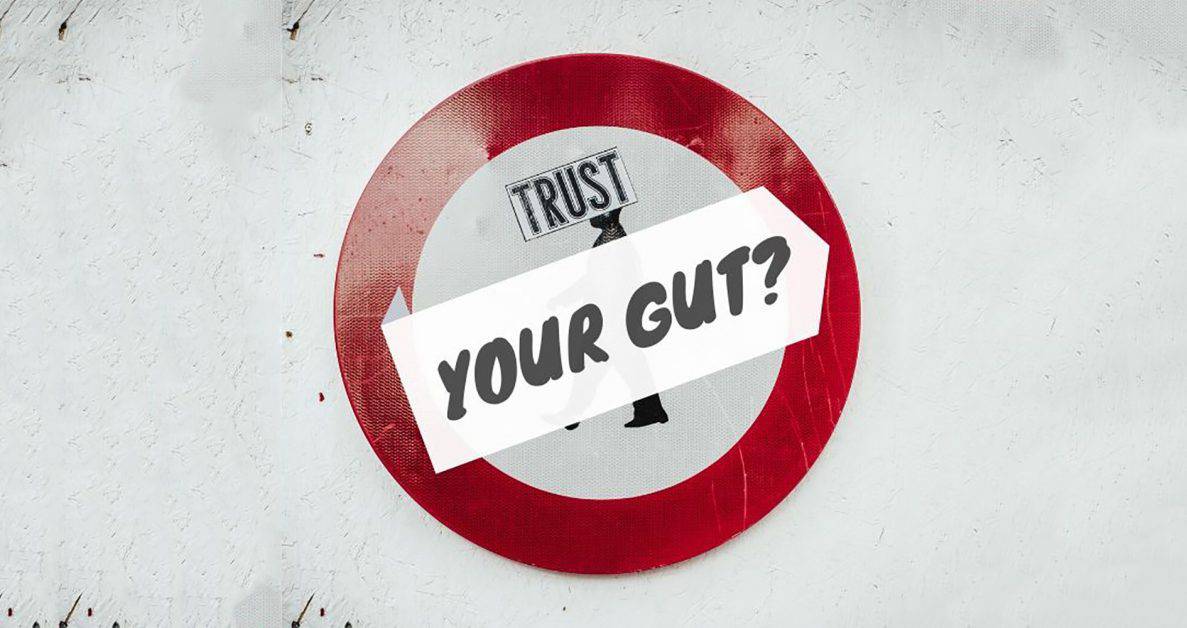0
Home > Emotional wellbeing > Mental health > What Are Gut Instincts and Should You Trust Them?


Gut instincts are the immediate, intuitive reactions we have to certain situations or stimuli. These automatic responses are believed to be developed from past experiences, using memories from similar situations to make fast decisions.
When we find ourselves facing a decision, we often have two clear responses: the logical brain, and the gut feeling. We’ve all felt it before, an instinctive feeling in your stomach usually pertaining to something being wrong.
“Trust your hunches. They’re usually based on facts filed away just below the conscious level.” – Dr Joyce Brothers
The neurons in our gut are in constant communication with the neurons in our brain. For example, I, as person with anxiety, feel nauseous when over stimulated. My gut reaction is to leave, but the anxiety is in my head. Full body reactions to a stimulus in the brain, to external environments or decision making is a common occurrence we all know well. Usually, these instincts are something that our gut picks up on that our brain doesn’t.
But in an age of logic, trusting your gut or going with your instincts often results in others thinking you’re slightly mad, questioning your decision-making skills and making you second guess yourself all the time.
In some cases, this isn’t a bad thing. We develop unconscious bias, influenced by our past experiences, cultures, family, everything really. So sometimes our gut reactions are bias towards similar issues, and often don’t fully reflect our needs or wants. So sometimes, stopping and questioning your gut reaction and why you had it is a good thing do to, if it means you might miss out on a good opportunity.
But for the most part, the gut instinct is solidly believed to connected to our evolutionary instincts of fight, flight, freeze, food, fornicate. Our natural instincts when coming across danger, predators or other people. Not so much needed nowadays, but perhaps as a woman walking home at night you have the stomach punching instinct to walk faster, to stand closer to a friend, to lock your cars doors.
“If it doesn’t feel right, don’t do it. Trust your intuition and don’t ask “why”, just say no.” – Maria Erving
Our instincts exist to protect us. To keep us safe. They are usually a result of fear or defence, hence, fight or flight.
I am an advocate of trusting my gut. If a situation feels wrong, I leave it. And I’ve received some questions and disbelief from my family members and friends who can’t see the logical reasoning behind my choices. Because there isn’t one. But I don’t regret a single one.
These instincts aren’t always founded from fear or discomfort. They could be things like…
It might be a sudden, overwhelming feeling to say yes to something you might not usually say yes to.
To say no to a job, offer, to break up with a lover or a friend; to apply for something completely different, go on a date with someone different, call your friend out of the blue.
Sometimes trusting ourselves is something we need to do in order to care for ourselves, respect ourselves, a form of self-love if you will.
Whether you call it trusting your gut, homing in on energies, listening to your body, your heart, the universe, these instincts are there for a reason. You don’t have to go along with them, but you shouldn’t ignore them.
“I do not feel any obligations toward my lineage, or environment, but an inclination to what feels right.” – Natasha Tsakos

-


Dr Singh is the Medical Director of the Indiana Sleep Center. His research and clinical practice focuses on the myriad of sleep.

It must be that time of the month again…or is it? Wait, didn’t I just get my period a couple of weeks ago? So, why am I so bloated? While most of us expect to feel bloated during our period,

The Pill has a whole slew of well-known side effects ranging from inconvenient breakthrough bleeds to headaches, abdominal pain, and nausea. And, anyone who’s ever used hormonal birth control knows that the side effects are not just physical. They’re psychological

Have you ever experienced spotting? Have you wondered whether it is normal or whether you should be concerned and visit a doctor? Being a woman is hard and can be so confusing! We are all different and sometimes it is
Hormona© 2024, All Rights Reserved
